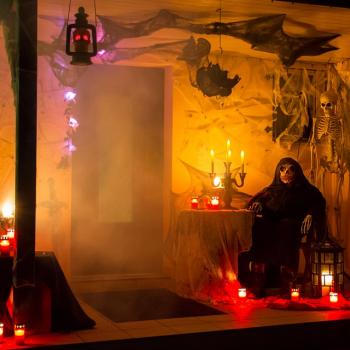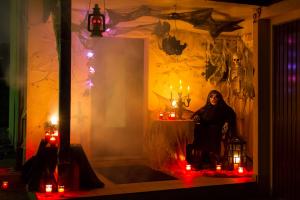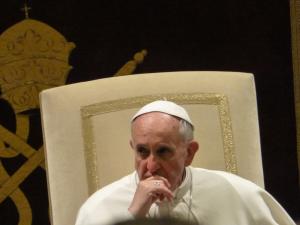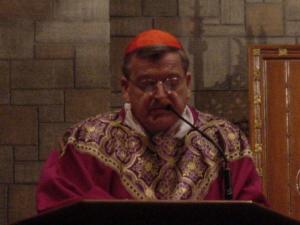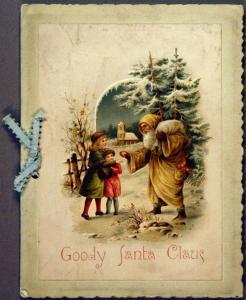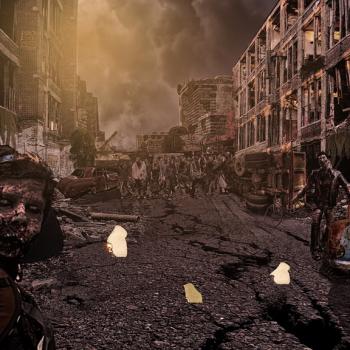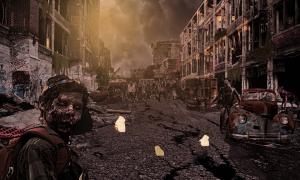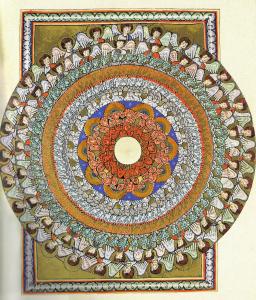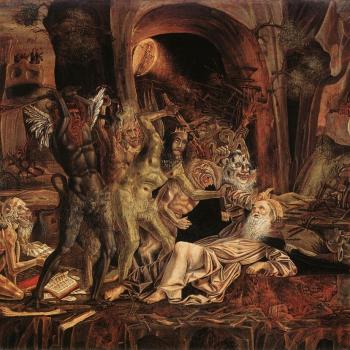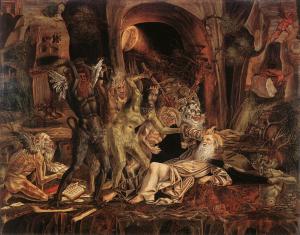
The church is full of the spiritually sick and infirm, that is, sinners. As Pope Francis explained, it can be and should be seen as a field hospital. We are its patients. The church, with the graces given to it, has the spiritual draught that not only can heal us, but give us strength to become better than before. However, our sickness is not just our own. When we are sick, we can infect others with our spiritual disease. It can form a spiritual pandemic, leading to many suffering from the same malady as we do. Indeed, just as with physical illness, those who come in contact with the sick can find themselves infected by the illness they have come to cure. Even doctors can get sick, and sometimes, even though they are sick, their patients need them so much they still continue their work despite their illness.
Within the church, many of those who have been given a special charism to serve the needs of the community, and so have been granted special authority in order to make sure they can fulfill their role, not only are sick themselves, but often, their illness is worse than others because of the way they abuse the authority given to them. Priests and bishops can be great sinners. Nonetheless, the medicine they have to offer can still help those who receive it because it does not rely upon the character and quality of those who offer it to be effective. But yet, when such doctors are spiritually sick, that is, when they are great sinners, it should not surprise us that many will flee from them and seek aid elsewhere. This is a problem older than the institutional church itself. We find throughout history that those who have been given some spiritual authority, those who have been given various elements of grace to share with others, often are the ones who need it most. Instead of taking it in, cooperating with it, they resist it themselves. Thus, many today who have what we need are the cause of many of our problems, as their sin, their sickness, spreads quickly throughout the church, causing many to follow after them in their sickness, leading many astray, hurting everyone as a result of their sin. This is why we must be cautious. We must respect the charism and grace which is offered, but we must not do so in such a way as to fall for clericalism. This is why Jesus, when dealing with spiritual leaders of his day, acknowledged their charism, but warned his audience not to be like them:
Then said Jesus to the crowds and to his disciples, “The scribes and the Pharisees sit on Moses’ seat; so practice and observe whatever they tell you, but not what they do; for they preach, but do not practice. They bind heavy burdens, hard to bear, and lay them on men’s shoulders; but they themselves will not move them with their finger. They do all their deeds to be seen by men; for they make their phylacteries broad and their fringes long, and they love the place of honor at feasts and the best seats in the synagogues, and salutations in the market places, and being called rabbi by men” (Matt. 22:1-7 RSV).
Jesus, in saying this, has shown us the proper response to Donatism. We do not have to ignore the problems which exist within the institutional church. We can and should recognize that many ecclesiastical authorities are causing trouble for the church itself. However, we should also realize that the grace of God is greater. God is still at work in and through them, offering us the spiritual medicine which we need. God, of course, is not bound by those gifts and the normative ways in which they come, that is, God is not bound by the sacraments. However, we can and should recognize that if we receive them, we will receive grace, despite the character of those who give them to us. We do not have to worry about grace. Those who cause scandal and turn people away because of what they say or do will find that the words Jesus said concerning the spiritual leaders of his day applies to them as well:
Woe to you, scribes and Pharisees, hypocrites! for you tithe mint and dill and cummin, and have neglected the weightier matters of the law, justice and mercy and faith; these you ought to have done, without neglecting the others. You blind guides, straining out a gnat and swallowing a camel (Matt. 22:23-4 RSV).
Law, justice, mercy and faith should be what is promoted by those who have been given the spiritual charism which places them in positions of authority in the institutional church. The law should be the greater law, the law of love, the law which tells us to love God and to love everything and everyone through our love for God. Justice should promote harmony, a harmony which promotes, as it were, the middle path between extremes; if we truly love God, we would work for such justice, and find ourselves praising God in and through our promotion of justice:
St Dionysios the Areopagite says that God is praised through justice. This is true, for without justice all things are unjust and cannot endure. Justice is sometimes called discrimination: it establishes the just mean in every undertaking, so that there will be no falling short due to over-frugality, or excess on account of greed. For even if over-frugality and greed appear to be opposites, the one below and the other above justice, yet they both push us in some way towards injustice. Whether a line is convex or conclave, it still deviates from what is straight; and to whichever side the balance tilts, that side gets the better of the other side. [1]
Mercy, of course, works with the law of love and justice, making sure that those who want to overcome their sins, overcome their injustice, will have the grace needed to do so. For without such grace, without such mercy, many who would otherwise repent would feel so burdened by their sins that they will be overcome by despair. Then, thinking they can do nothing to fix the problems they have created, they will not try to do so. Mercy, and the forgiveness which comes with it, allows them to see that their efforts can be fruitful, that they can indeed repent and change their ways and work for justice; they will be shown that even if they are not capable of doing it all themselves, they will find that grace will supply what is necessary so that their work for justice, their work for reparation, can lead to their own justification.
When love, mercy, grace, and justice are promoted, people will have a reason for their faith; those priests who follow these principles, therefore, are among those who help us keep our faith despite whatever sickness is currently infecting the institutional church. This was J.R.R. Tolkien’s understanding; he said that all the experience he had with bad priests was overcome by the charity of one imperfect priest, Fr. Morgan:
I have met snuffy, stupid, undutiful, conceited, ignorant, hypocritical, lazy, tipsy, hardhearted, cynical, mean, grasping, vulgar, snobbish, and even (at a guess) immoral priests “in the course of my peregrinations’; but for me one Fr. Francis outweighs them all, and he was an upper-class Welsh-Spaniard Tory, and seemed to some just a pottering old snob and gossip. He was – and he was not. I first learned charity and forgiveness from him; and in the light of it pierced even the ‘liberal’ darkness out of which I came, knowing more about ‘Bloody Mary’ than the Mother of Jesus – who was never mentioned except as an object of wicked worship by the Romanists. [2]
Tolkien did not discount all the evils found within the church; he knew and understood how the failures of priests and bishops, and others with spiritual authority, have caused many to lose their faith. He did not disagree with those who were critical of such abuses; he only thought that we must look beyond them and look for those who best represent the faith in action, those who follow justice and mercy, because it is in and through them we see the full reality of Christ’s teachings and what they have to offer if they are properly lived out. Tolkien, in this instance, was in agreement with Dorothy Day:
What I feel about the institutional church for instance. For me it is the place in the slum, in our neighborhood, where it is possible to be alone, to be silent, to wait on the Lord. The sacraments mean much to me. The daily bread we ask for is there. To sit in the presence of the Sun of Justice is healing, though I have to force myself to remain in fatigue and fullness and misery often. But the healing is there too. No matter how corrupt the Church may become, it carries within it the seeds of its own regeneration. To read the lives of the saints has always helped me. We’ve had corrupt popes and bishops, down through the ages, but a St. Francis, a St. Benedict, a St. Vincent de Paul, a Charles de Foucauld will keep on reminding me of the primary of the spiritual. Peter Maurin used to tell us to study history through the lives of the saints. [3]
The reform of the church is always to be found within the seeds of grace which have been given to, or placed within the church. Those who cooperate with grace will seek to constantly reform themselves and the institutional church. They will become the saints of the present age, the saints needed for the present day. Through them, we will see that the charisms given to the church can be effective, for through them, we see many great sinners become great saints, doing work which transcends our expectations. When we come in contact with such saints, we will see the value of grace, for we see the practical effect of such grace in their lives. That is, when we see their transformation, it will be impossible for us to deny the effectiveness of the spiritual medicine which is offered by the church. We need the spiritual food which it offers. And so, even though many within the institutional church will cause scandal, because what the church offers is grace, and grace is greater, grace will offer us the means to transcend such scandal and work to make sure the church itself is put back on track. We are all called by the grace given to us to do this. We are all called to be saints. We might now be sick, but hopefully, when we come to the field hospital, we will receive the medicine we need so that, with it, we will not only become better, but we will also be able to help others, in and outside of the church, receive the grace which they need for their own spiritual health.
[1] St. Peter of Damaskos, “Twenty Four Discourses” in in The Philokalia: The Complete Text. Volume Three. Trans. G.E.H. Palmer, Philipp Sherrard and Kallistos Ware (London: Faber and Faber, 1986), 258-9 [Discourse XX: Justice].
[2] J.R.R. Tolkien, “Letter to Michael George Tolkien. January 6, 1965” in The Letters of J.R.R. Tolkien. Ed. Humphrey Carpenter (Boston: Houghton Mifflin Company, 1981), 354.
[3] Dorothy Day, “Letter to Karl Meyer. August 13, 1981” in All The Way To Heaven: The Selected Letters of Dorothy Day. Ed. Robert Ellsberg (New York: Image Books, 2010), 491-2.
Stay in touch! Like A Little Bit of Nothing on Facebook.
If you liked what you read, please consider sharing it with your friends and family!







